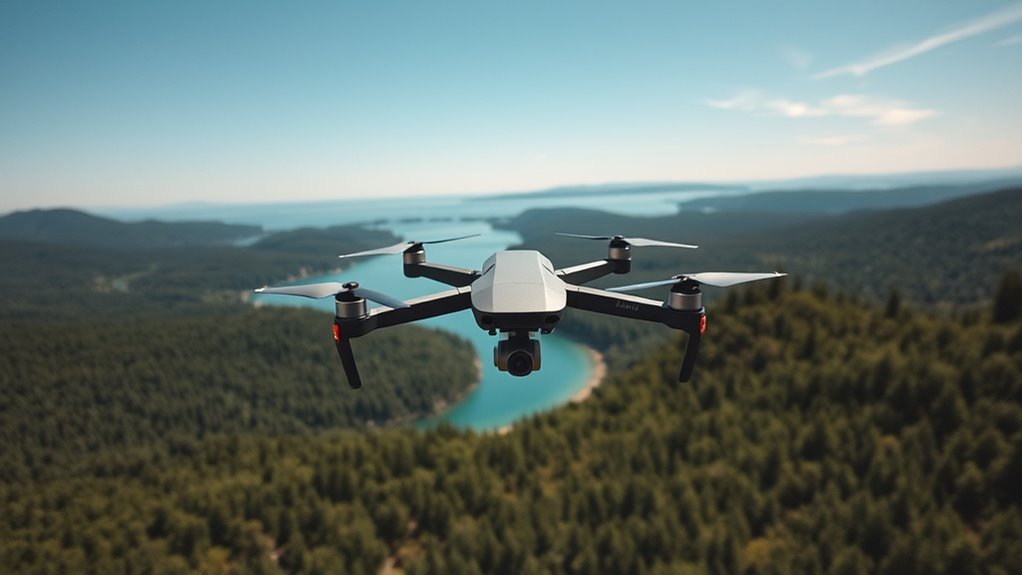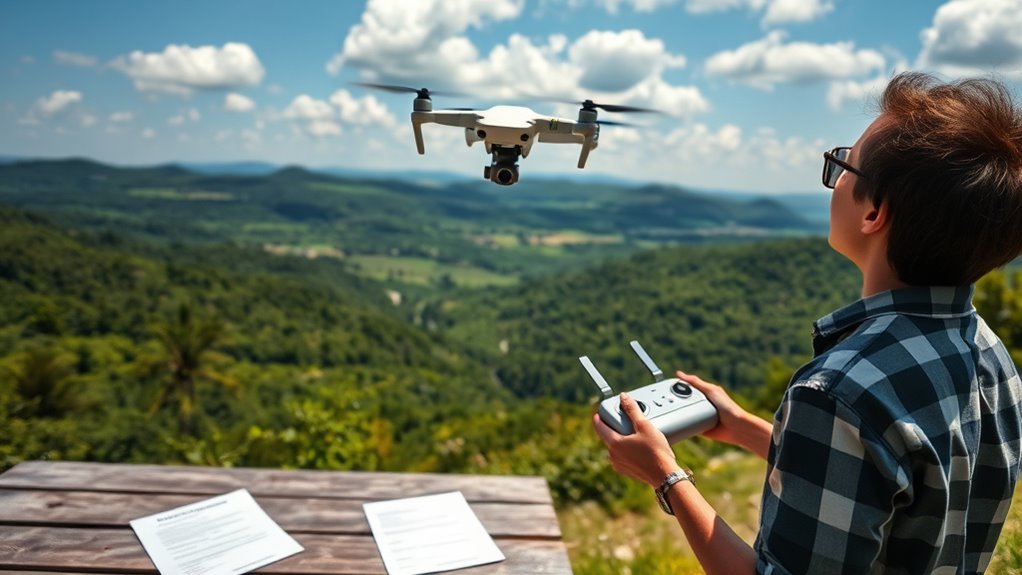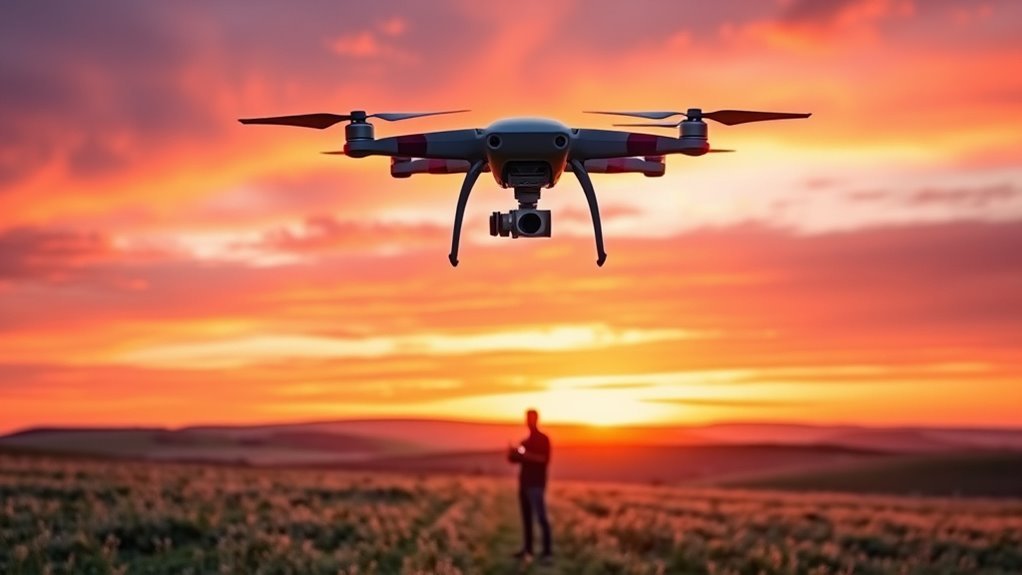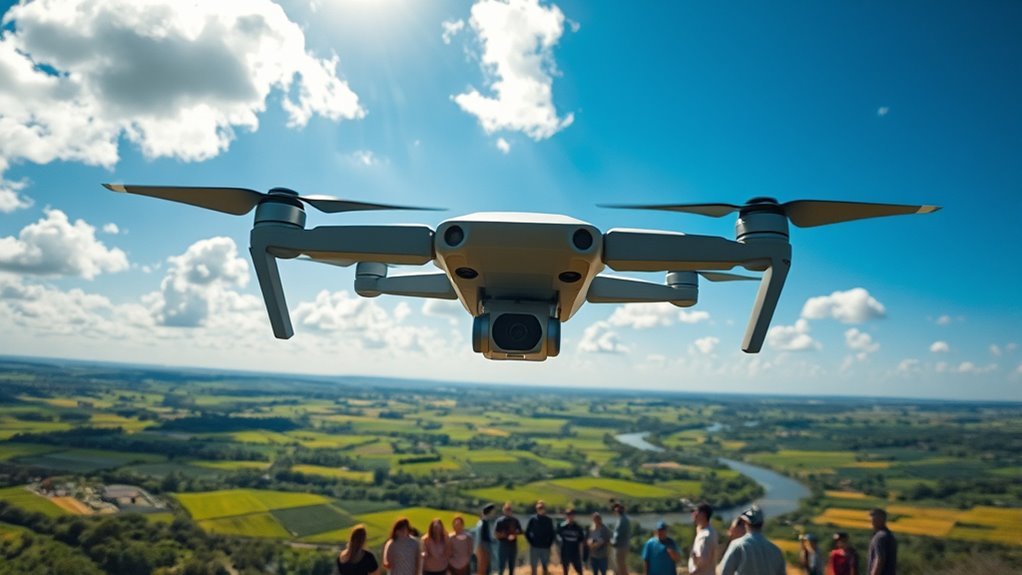Yes, you typically need a drone license if you plan to operate commercially. The Part 107 License is required for these purposes, ensuring compliance with federal regulations. If you’re flying recreationally, a license isn’t necessary, but you must still follow safety guidelines, including weight limits and maintaining visual line of sight. Regulations vary by region, so staying informed is essential. There’s more to understand about exemptions and penalties that apply to drone operations.
Understanding Drone Regulations

When maneuvering through the world of drone operation, how well do you understand the regulations that govern it? Adhering to these rules is essential for ensuring drone safety and enjoying the freedom of flight. First, familiarize yourself with airspace restrictions, as different zones have specific regulations. For instance, flying near airports or in restricted military areas can lead to severe penalties. Always check local laws, as they may vary by region. Additionally, understanding weight limits and altitude caps is vital for compliant operation. By prioritizing safety and respecting airspace regulations, you not only protect yourself but also uphold the integrity of the drone community. Empower yourself with knowledge to navigate legally and responsibly in the skies. Furthermore, being aware of signal attenuation can help you plan your drone flights effectively, ensuring you remain within operational limits while maximizing your data collection capabilities. Remember, maintaining visual line of sight is crucial for safe navigation and compliance with regulations.
Types of Drone Licenses

When operating a drone, it’s important to know the different types of licenses you may need. The Part 107 License is vital for commercial use, while a Recreational Use License applies to hobbyists. Additionally, you might require a Temporary Flight Authorization for specific operations in controlled airspace.
Part 107 License
Are you considering flying your drone commercially? If so, you’ll need to obtain a Part 107 License, which is essential for compliance with FAA regulations. This license allows you to operate your drone for business purposes, but it comes with specific Part 107 requirements that you must meet.
Here’s a quick overview of the key aspects:
| Requirement | Description |
|---|---|
| Age | Must be at least 16 years old |
| Knowledge Test | Pass a written Part 107 testing |
| English Proficiency | Speak, read, and write English |
| Medical Certification | Hold a valid medical certificate |
| Registration | Register your drone with the FAA |
Recreational Use License
If you’re flying a drone just for fun, you won’t need a Part 107 License, but there are still important guidelines to follow under the FAA’s recreational use regulations. You must fly your drone within visual line of sight, and it should weigh less than 55 pounds. Prioritize drone safety by avoiding restricted airspace and staying away from people and vehicles. Familiarize yourself with local flying restrictions, as these can vary by area. Additionally, you must register your drone if it weighs over 0.55 pounds. Following these rules not only guarantees your freedom to fly but also promotes responsible drone usage within the community. Stay informed, stay compliant, and enjoy your recreational flying experience!
Temporary Flight Authorization
How can you guarantee that your drone flights comply with regulatory requirements? One way is through the Temporary Flight Authorization (TFA). This is significant when operating in controlled airspace where standard approvals might not suffice. The authorization process involves submitting a request to the relevant aviation authority, detailing your flight plan and intended operations. If approved, you’ll gain the freedom to operate your drone legally, even in restricted zones. It’s important to understand that TFAs are typically granted for a limited timeframe, so planning accordingly is essential. By securing a TFA, you not only guarantee compliance but also enhance safety and accountability, empowering you to explore the skies responsibly while enjoying the flexibility that drone flying offers.
Who Needs a Drone License?

If you operate a drone for commercial purposes, you’ll need a license to comply with federal regulations. Recreational users may also need to take into account specific state laws that could require a permit. Understanding these requirements is essential to guarantee you’re flying legally and safely. Additionally, all drone types must be registered with the Nicaraguan Civil Aviation Authority to ensure compliance with local regulations.
Commercial Drone Operators
As the demand for aerial services continues to grow, understanding who needs a drone license becomes essential for commercial operators. If you’re planning to operate a drone for business purposes, you must obtain a Remote Pilot Certificate from the FAA. This requirement guarantees compliance with industry standards and promotes drone safety. Whether you’re capturing real estate photos, surveying land, or performing inspections, your adherence to regulations safeguards both your operations and the public. Failing to secure the appropriate license can lead to hefty fines and legal repercussions. By obtaining your drone license, you not only enhance your credibility in the market but also embrace the freedom to explore new opportunities in the rapidly evolving aerial service industry.
Recreational Drone Users
While commercial drone operators must secure a Remote Pilot Certificate, recreational drone users face different regulations regarding licensing. You don’t need a license to fly a drone for fun, but adhering to drone safety guidelines is vital. The Federal Aviation Administration (FAA) recommends that you fly below 400 feet, keep your drone within visual line-of-sight, and avoid restricted areas like airports and military bases. Although you’re free to explore the skies, you must still respect flight restrictions to uphold safety for yourself and others. By understanding and following these regulations, you can enjoy your drone hobby while minimizing risks and contributing to a safe flying environment. Embrace your freedom, but always prioritize responsible drone operation.
Specific State Regulations
Although federal regulations set the baseline for drone operation, specific state laws may impose additional licensing requirements that you must consider. Each state has its own local drone laws, which can vary greatly. For instance, some states require drone operators to obtain permits or certifications not mandated federally. You’ll need to research state-specific requirements to guarantee compliance. Failure to adhere to these laws could result in fines or restrictions on your flying freedom. Always check with your state’s aviation authority for updates on regulations, as they can change frequently. By staying informed, you can continue to enjoy the liberty of flying your drone while adhering to the necessary legal frameworks.
How to Obtain a Drone License
If you’re looking to fly a drone commercially or for certain recreational purposes, obtaining a drone license is essential. Here’s how to get started:
- Enroll in Drone Training Programs: These programs will equip you with the knowledge and skills needed to operate a drone safely and effectively. Many offer online courses and hands-on training.
- Pass the FAA Written Exam: After completing your training, you’ll need to pass the FAA’s knowledge test. This exam covers regulations, airspace, and safety protocols.
- Pay Licensing Fees: Finally, submit your application along with any required licensing fees to the FAA. Keep in mind that these fees can vary based on the type of license you’re pursuing.
Once you’ve completed these steps, you’ll be ready to soar!
Exemptions and Exceptions
You might be surprised to learn that there are several exemptions and exceptions to the requirement of obtaining a drone license. For instance, if you’re flying a drone that weighs less than 0.55 pounds, you generally don’t need a license. Additionally, educational institutions may qualify for drone exemptions when using drones for research or training purposes. Some public agencies also benefit from licensing exceptions during emergency response situations. It’s essential to stay informed about specific regulations in your area, as they can vary. Always check the FAA guidelines to guarantee compliance with any potential drone exemptions or licensing exceptions that may apply to your situation, allowing you to enjoy your flying experience without unnecessary restrictions.
Penalties for Flying Without a License
Flying a drone without the proper license can lead to significant penalties, including hefty fines and potential legal repercussions. If you decide to fly unlicensed, here are some consequences you might face:
Flying a drone without a license can result in severe fines and legal trouble. Stay compliant to avoid these risks.
- Fines Incurred: You could face fines that range from hundreds to thousands of dollars, depending on the severity of the violation.
- Legal Consequences: Engaging in unauthorized drone operations may result in criminal charges, which could lead to a permanent mark on your record.
- Seizure of Equipment: Authorities may confiscate your drone, resulting in lost investments and further complications.
Understanding these penalties is essential if you value your freedom to fly. Always guarantee you’re compliant to avoid these serious consequences.
International Drone Licensing Requirements
As drone technology continues to evolve, so do the regulations governing its use across international borders. You need to be aware that each country has its own international regulations regarding drone operation. Some nations require specific licenses, while others may not require any at all. Familiarize yourself with global standards to guarantee compliance and avoid penalties. For instance, the European Union has established extensive drone regulations that differ from those in the United States. If you’re planning to fly a drone internationally, it’s vital to research the requirements of your destination country and any countries you may transit through. Understanding these regulations will empower you to navigate the skies freely and responsibly, guaranteeing a seamless flying experience.
Staying Informed About Drone Regulations
How can drone operators stay updated on rapidly changing regulations? Staying informed is vital for ensuring drone safety and compliance. Here are three effective strategies:
Staying informed on drone regulations is crucial for safety and compliance. Here are three key strategies to stay updated.
- Follow Official Websites: Regularly check the FAA and other relevant regulatory bodies’ websites for the latest regulatory updates, including federal aviation regulations that govern drone operations.
- Join Online Forums: Engage with drone communities on platforms like Reddit or specialized forums where enthusiasts share insights and news.
- Subscribe to Newsletters: Sign up for newsletters from drone advocacy groups and industry publications that provide updates on drone regulations and safety practices. Additionally, operators should be aware of privacy regulations that govern data collection and ensure they are not violating any laws while flying.
Frequently Asked Questions
Can I Fly a Drone Without a License for Recreational Use?
Flying a drone without a license for recreational use can feel like soaring through open skies. However, you must adhere to drone regulations and recreational guidelines to guarantee safety and legality while enjoying your freedom.
How Long Does It Take to Get a Drone License?
The drone training duration varies, typically taking a few weeks to several months. The licensing process steps include ground school, flight training, and passing the FAA exam, ensuring you’re well-prepared to fly safely and responsibly.
Are There Age Restrictions for Obtaining a Drone License?
Like a key opening a door, age requirements for a drone license typically mandate you’re at least 16. The licensing process guarantees you’re responsible enough to navigate the skies safely, enjoying your aerial freedom.
What Are the Costs Associated With Getting a Drone License?
When considering costs for getting a drone license, you’ll encounter licensing fees and training costs. These can vary considerably based on location and the specific training programs you choose to pursue, so budget accordingly.
Can I Use My Drone Commercially if I’M Not Licensed?
You can’t use your drone commercially without a license, as drone regulations require it for legal operation. Ignoring this could lead to fines or penalties, limiting your freedom to operate your drone effectively.

